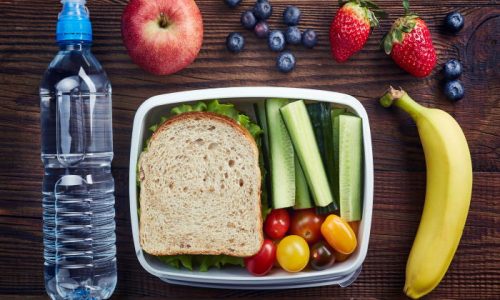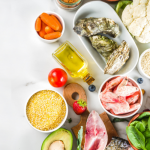By Dr Joanna McMillan
The importance of a balanced diet
Food plays a crucial role in all of our lives. Not just in terms of delivering the nutrients and energy our bodies need to function, but food is also part of our culture and our social interactions. Ultimately food should be an immensely enjoyable part of life.
For those of you living with MS it is arguably even more important that you eat well. Making the right food choices can help you to battle fatigue and have the energy to give and get more out of your day. Food can have a profound impact on your mood and likewise your mood can impact on your food choices. When you’re feeling down you may either find yourself skipping meals and not feeling like eating, or turning to comfort eating on all the wrong types of foods. Obviously both of these reactions are not ideal and will ultimately impact on your health and wellbeing.
MS can bring additional challenges to eating well however. Fatigue lowers your motivation to prepare a healthy meal. Or you may have difficulties with swallowing or with the physical nature of food shopping and preparation. Our goal on this website is to help you to find solutions to all of these factors and ultimately make your diet work for you.
What is a healthy diet?
That sounds like such a simple question yet with the abundance of diet information out there you’re forgiven, and certainly not alone, if you’re confused. Be aware that there are lots of unproven theories, outright nonsense, theories with half-truths and then some really good science. Sifting through it all can be impossible.
The truth is that there are many ways to put together a healthy diet, provided it is built on a few key foundations. Here are my top tips to creating your own healthy diet:
- Eat mostly real whole foods, close to the way nature intended.
- Ensure you eat lots of plant food. Aim to make half your plate at most meals veggies – or can be fruit at breakfast. These foods are rich in beneficial compounds, such as antioxidants, that benefit your body and it’s much safer to get them from food than supplements.
- Include legumes (chickpeas, lentils or dried beans) at least once a week. These foods provide stacks of fibre, plant protein, slow release energy giving carbs and an impressive array of nutrients including folate.
- Choose whole grains such as wholegrain bread, brown rice, wholegrain pasta, rolled oats, high fibre breakfast cereals, muesli and pseudo grains such as quinoa, amaranth and buckwheat. These deliver excellent levels of fibre that will help to keep you regular, your gut healthy and provide what I call ‘smart carbs’.
- Limit refined grain products (those made with white flour as a major ingredient) and foods or drinks with lots of added sugar. Save sugary foods as an occasional treat if you really love them.
- Enjoy a handful of nuts every day (allergies excepted). Nuts are full of healthy fats your body needs along with fat-soluble nutrients, fibre and plant protein. If you struggle to eat whole nuts or are fearful of choking, then try nut butters.
- Include seafood in at least three meals a week. Oily fish such as salmon, trout or sardines are especially good as they provide the best levels of the long chain omega-3 fats. These have an anti-inflammatory effect in the body and are important for brain health. While more research is needed, there is some evidence that these fats may decrease the severity and frequency of MS attacks, and lower disability in people with relapsing remitting MS. Canned fish and frozen fish are perfectly acceptable and being convenient they will help you to get more fish into your menu.
- Limit processed meats such as bacon, salami and ham and if you do enjoy them, eat with plenty of protective veggies in the same meal.
- Enjoy fresh red meat 2-3 times a week with a serve being about the size of the palm of your hand. Red meat is excellent for iron and since low iron levels will contribute to your fatigue, it’s essential you meet your iron demands.
- If you are a vegetarian or vegan, ensure you eat plenty of alternative protein sources. Legumes, tofu, nuts, seeds, whole grains and even some vegies all provide plant protein. Vegetarians will also benefit from including dairy foods and eggs.
- Include 2-3 serves of dairy a day (allergy and intolerances allowing) to help you meet your demand for calcium. If you don’t eat these foods you need to include alternative sources of calcium such as fortified soymilk and tofu.
Further information on healthy eating can be found on the [Australian Dietary Guidelines website] https://www.eatforhealth.gov.au/.
Making it work for you
Of course, these tips are all very well in theory but the practicalities of eating well can make it seem impossible. Help yourself to eat well by making it easier. Here are a few ideas:
- Use Internet shopping to have your groceries delivered. That way you won’t waste precious energy wandering around the supermarket and you can ensure you always have your kitchen stocked with the right foods.
- When you are cooking make extra and keep in the fridge or freezer for those nights when MS fatigue hits and you really can’t summon the energy to cook.
- Stock your pantry with healthy convenience foods such as canned legumes, canned fish, canned tomatoes, wholegrain pasta, microwavable brown rice sachets and good quality jars of ready to use sauce. With the right produce you can always throw together a quick healthy meal, even if the fridge is bare.
- Invest in a good quality blender so that you can whip up nutritious smoothies. If you have swallowing difficulties a thicker smoothie will be easier for you to manage. Adding a frozen banana, a handful of oats or a fibre supplement is a great nutritious way to thicken your smoothie.
- Identify a few healthy takeout or prepared meal options. Thai stir-fries, BBQ chicken with salad or a tomato based pasta with lean meat or seafood are all good choices.







